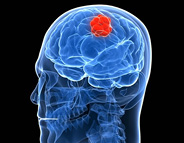 |
 |
 |
 |
 |
   |

 |
 |
 |
 |
| |
 |
May 14, 2012 |
 |
The new WHSC At A Glance brochure includes facts and figures about schools, centers, and hospitals, including students, employees, patients, and research.
The Scientist magazine recently named Emory the 12th best institution in the nation for postdocs. Read the Best Places to Work for Postdocs survey and the factors that influence rankings.
Emory public health and infectious diseases expert Keith Klugman has developed a "Drug Resistance Index" in cooperation with the Center for Disease Dynamics, Economics, and Policy in Washington, D.C. The index combines data for various drugs and shows antibiotic use in each state shown on an interactive map.
|
 |
| |
|
|
|
 |
 |
 |
 |
|
|
| |
|
|
|
|
Singing the Blues for Aggressive Brain Tumors
Emory and Georgia Tech researchers have designed a new treatment that seems to halt the spread of invasive brain tumors in animal models. Infusing a molecule called imipramine blue, followed by conventional chemotherapy, caused tumors in rats to stop their invasion into healthy brain tissue, and the animals survived longer. Read more... |
| |
|
|
|
|
|
 |
 |
 |
 |
|
Drenna Waldrop-Valverde, PhD
|
| |
|
|
|
|
| |
Improving Health Literacy in HIV/AIDS
A neuro-psychologist/nursing researcher is leading a project to improve HIV/AIDS health literacy in underserved populations. Project READ (Research to Eliminate AIDS Disparities) aims to prevent new HIV infections, increase access to care, and reduce health disparities. The study will focus on helping patients understand instructions and take their medications regularly and properly, which is of critical importance in avoiding drug resistance. Read more... |
|
|
|
| |
|
|
|
|
|
 |
 |
 |
 |


Max Cooper, MD, PhD |
| |
|
|
|
|
| |
Founder of Modern Immunology
Emory immunologist Max Cooper, also a Georgia Research Alliance Eminent Scholar, is considered the "giant" of modern immunology. His discoveries about how antibodies are produced through his research on the development of the B-cell immune system, much of it done before the era of cloned genes, has formed the basis of medical advances from bone marrow transplants to monoclonal antibodies. Read more... |
|
|
|
|
|
|
|
|
|
 |
 |
 |
 |
|
| |
|
|
|
|
| |
Drug-Induced Cooling Decreases Brain Damage in Research Model of Stroke
Hypothermia, or lowering the body's temperature, has been shown in clinical trials of stroke to reduce the needs of neurons for energy and diminish toxic chemicals that accumulate in the brain. But quickly cooling the body is difficult to manage. Now a drug that induces hypothermia has been shown to decrease brain damage and improve recovery after stroke in mice. Drug-induced cooling after stroke could be quicker and easier to regulate. Read more... |
|
|
|
| |
|
|
|
|
|
 |
 |
 |
 |
| |
| |
|
|
|
|
| |
Medications Can Ease Depression in Parkinson's Without Worsening Symptoms
Depression often dramatically impacts the quality of life for Parkinson's patients, with half of the nearly 1 million Americans with Parkinson's disease also suffering from depression. Older drugs for depression have sometimes worsened Parkinson's symptoms, but a new study shows two newer drugs were effective in treating depression without serious side effects. Read more... |
|
|
|
|
|
|
|
|
|
|
 |
 |
|








